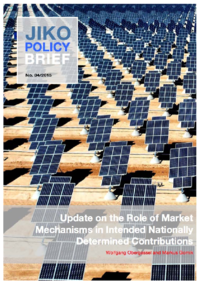
This paper surveys Parties’ intended nationally determined contributions (INDCs) to gauge the potential scope of market mechanisms in the forthcoming Paris agreement. At the time of writing, 147 Parties had submitted INDCs. Among these, 66 are planning and 20 are considering to use international market mechanisms.
While 86 is a high number, the vast majority intend to be sellers in the carbon market. In addition, these countries are mostly low-income countries which have so far not had much success in using the CDM. Only thirteen Parties intend to buy units. Five Parties that do not intend to use international mechanisms highlight their use of domestic systems. In addition, a number of countries envisage using both international and domestic systems. What this indicates is that there are ongoing dynamics at national and sub-national levels, but demand for units from international mechanisms continues to be low, the decline of their role is therefore unlikely to be reversed soon.
Of the Parties that may use international mechanisms, the majority does not specify which mechanisms they intend to use. 23 Parties specify the Clean Development Mechanism (CDM), six reducing emissions from deforestation and forest degradation (REDD+), four the new market mechanism (NMM), four (credited) nationally appropriate mitigation actions (NAMAs), and one the Framework for Various Approaches (FVA).
While the INDCs do not necessarily deliver a full picture, using them as basis suggests that reform of the existing CDM and capacity building for its use by low-income countries may be a significantly higher priority than development of new mechanisms. Large emitters are apparently taking the route of domestic emission trading systems rather than international mechanisms. While domestic emission trading systems could in theory be linked with each other, based on the current political discussions these will in practice for the foreseeable future probably be limited to the regional level.
The study is an update on JIKO Policy Brief 03/2015 and is now available for download.
Obergassel, W., Gornik, M.: Update on Role of Market Mechanisms in Intended Nationally Determined Contributions. JIKO Policy Brief 04/2015. Wuppertal Institute for Climate, Environment and Energy. Wuppertal - 21 p., 3 figures, 1 table.
Date:
November 2015
Cookie Settings
Marketing-Cookies werden von Drittanbietern oder Publishern verwendet, um personalisierte Werbung anzuzeigen. Sie tun dies, indem sie Besucher über Websites hinweg verfolgen.
Provider:
Statistik Cookies
Statistik-Cookies dienen der Analyse und helfen uns dabei zu verstehen, wie Besucher mit unserer Website interagieren, indem Informationen anonymisiert gesammelt werden. Auf Basis dieser Informationen können wir unsere Website für Sie weiter verbessern und optimieren.
Provider:
Erforderliche Cookies
Erforderliche Cookies sind für den reibungslosen Betrieb der Website zuständig, indem sie Kernfunktionalitäten ermöglichen, ohne die unsere Website nicht richtig funktioniert. Diese Cookies können nur über Ihre Browser-Einstellungen deaktiviert werden.
Provider: